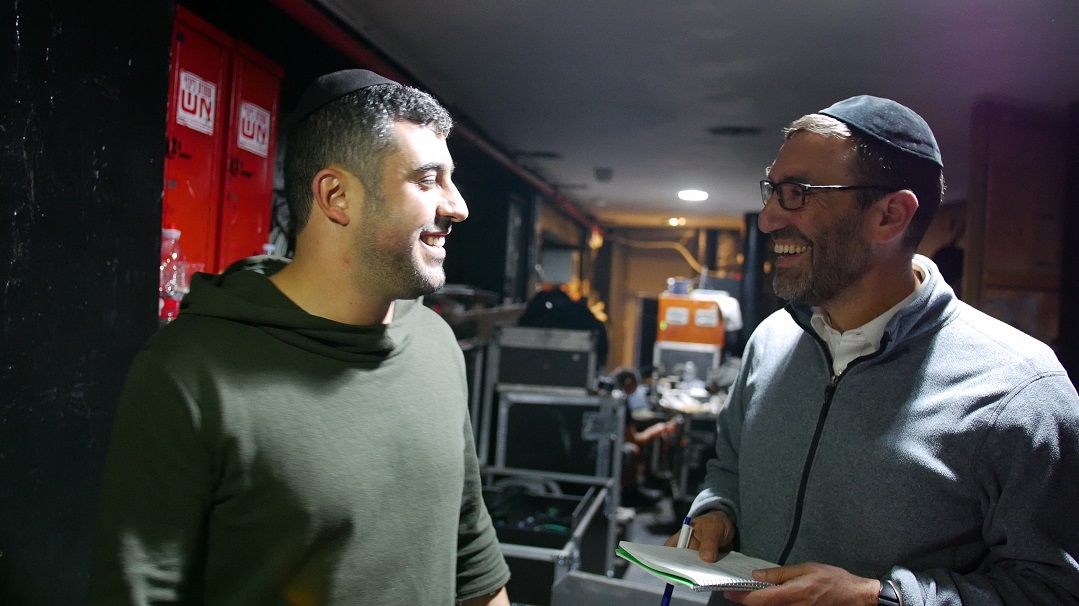The Great Harmonizer
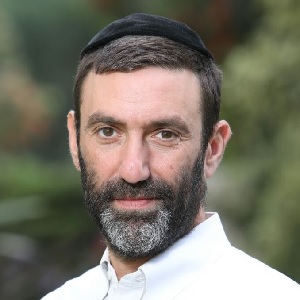
Ishay Ribo’s star is rising, and with it comes a message of hope, faith, and unity
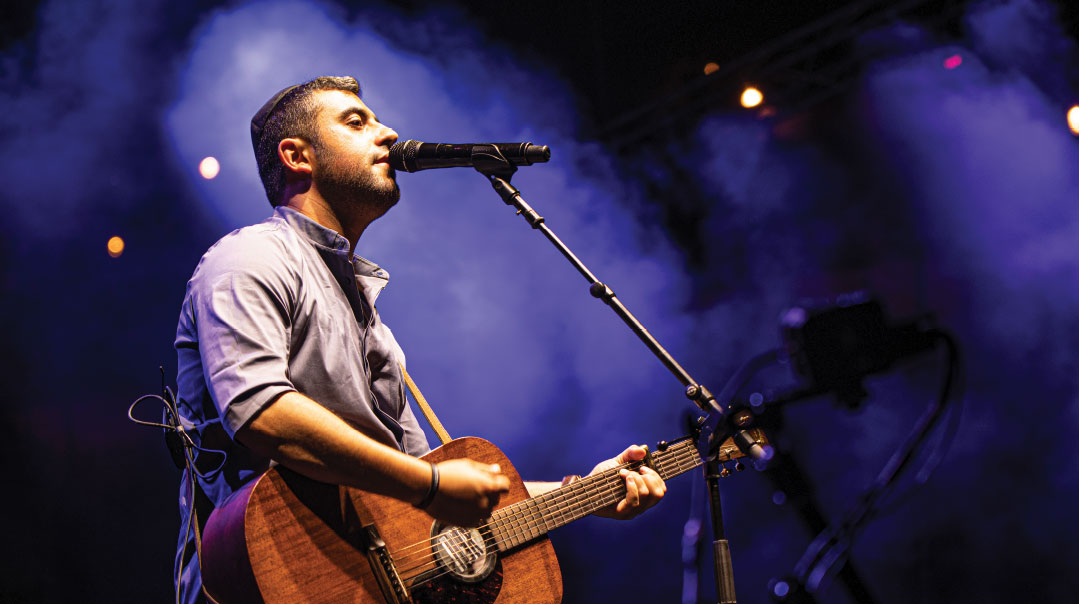
Photos Pinchas Emanuel, Shlomi Pinto
Last week, on the first downpour of the winter, Ishay Ribo was sitting with his band around a wobbly wooden table in a far corner of the Jerusalem International Convention Center, otherwise known as Binyanei Ha’umah.
Cigarette smoke hung in the air, water bottles were scattered about, and one of his producers was playing backgammon with a balding schlepper. Ribo’s guitarist, long peyos reaching his shoulders, slouched in a wooden chair, texting on his phone. His bass player, a small cap atop his head, wore a weathered jacket and a blank expression. Ribo, his beard trimmed close, his short hair slightly graying, tzitzis hanging out of a gray hoodie, sat in the middle of his crew, his eyes at attention.
WATCH ISHAY AND GERSHON BACKSTAGE!
The linoleum on the floor is cracked, the yellow paint on the walls is peeling, and the fluorescent light above casts a dim glow, but here sits perhaps Israel’s hottest act, preparing for a show. Fish with rice and salad is passed around on paper plates, and, between mouthfuls, the band works out the song lineup, scribbled on a piece of notebook paper.
The scene is right out of a clubhouse — kids seated in a circle playing marbles, friends gathered around a table for a friendly game of cards. There is camaraderie in the air, but also a hint of tension, as if something big is about to happen but no one is exactly sure what.
Ribo is 30 years old, and until a few years ago he was a minor act on the Israeli music scene. Then came his big break, in 2014, when Idan Raichel, a pop star regarded as one of Israel’s most creative and popular musicians, as well as a taste maven with the ability to launch careers, invited Ribo on stage to play a song.
That song, “Tocho Ratzuf Ahavah,” remains Ribo’s calling card, his classic, the sound that other Israeli artists now try to imitate and the melody that has endeared him to the full spectrum of Israeli music lovers, from the proudly secular to the starkly religious.
The song embodies Ribo as an artist. It is both delicate and energetic, full of longing yet exploding into hope. It is also a deeply religious song, with sources in Navi, Tehillim, and Mishlei, and yet its lyrics are easily accessible. It is a foot-tapping pop song with lyrics worthy of poetry.
The song is Ishay Ribo and Ishay Ribo represents the Israeli moment. He is Sephardi but appeals to the entire mishmash of Israeli society — Ashkenazim, chassidim, unidentified. He is a yeshivah graduate who wears a big black kippah and long tzitzis, yet secular Tel Avivans sing along to his songs with the same gusto that chareidim from Beit Shemesh do. He is a former singer in the army band who was invited to perform at both Israel’s nationally televised Independence Day celebration and its Memorial Day commemoration.
To date, he has released four albums — one of which went platinum, two of which went gold — and has recorded duets with a gamut of Israeli pop stars, from legend Shlomo Artzi to chassidic star Motti Steinmetz to pop king Omer Adam. Next year he plans a worldwide tour with stops in the United States, Canada, Mexico, France, and South Africa (he plays Queens College on June 4 and Saban Theater in Los Angeles on June 7), an impressive schedule of international concerts for an Israeli musician who sings in Hebrew and speaks little English.
It’s easy to pinpoint Ribo’s appeal. His voice is smooth and melodic, with a note of truth and urgency. Many of his songs are centered around acoustic guitar, which he plays, or piano, manned by his longtime collaborator, David Ichelovitch. It’s hard to identify his style, but it’s probably best described as soul-spiritual or folk-rock.
Menachem Toker, Israel’s most popular chareidi broadcaster, who appears daily on Radio Kol Chai and weekly on Channel 13, describes Ribo as a musician who has accomplished the rare feat of cutting across Israel’s sharply defined societal lines.
“Ishay Ribo is mamash frum, every yeshivah bochur can listen to his music,” says Toker. “But he’s also the bridge between the chareidi and chassidic and the dati-leumi. He is the only singer in Israel today loved by the frum and the frei. Some like [Yaakov] Shewkey and some like Omer Adam, but there’s no consensus like Ishay Ribo.”
Toker has high praise for Ribo’s use of language, likening it to the Hebrew poets of old. “I would compare his lyrics to the most famous composers of selichos, piyutim, and zemiros,” he says. “His lyrics are unbelievable. I think he is the most talented Jewish singer of his generation, no doubt.”
Yossi Zweig, host of The Z Report, an online Jewish music program based in New York, has been familiar with Ribo’s music for a number of years, but first saw him perform last winter in New York. In general, he says, Israeli singers have a hard time breaking into the American market. There’s the question of language, but there are also barriers in culture and style. That’s why he was surprised when he walked into the Town Hall auditorium in Manhattan for the show.
“It’s a decent-sized theater, not your typical Jewish concert venue, and I’m looking around and I see secular Jews, Israeli Jews, all walks of life, and then I bump into Eitan Katz,” he says, naming the Far Rockaway–based, Carlebach-inspired singer. “I’m like, what is Eitan Katz doing here? And he’s like, ‘I love Ishay Ribo’s music.’ [Composer] Yossi Green was there. [Singer] Eli Schwebel was there. There were about 1,800 people, and everybody is singing along to every lyric. I go to concerts often, and you don’t see that.”
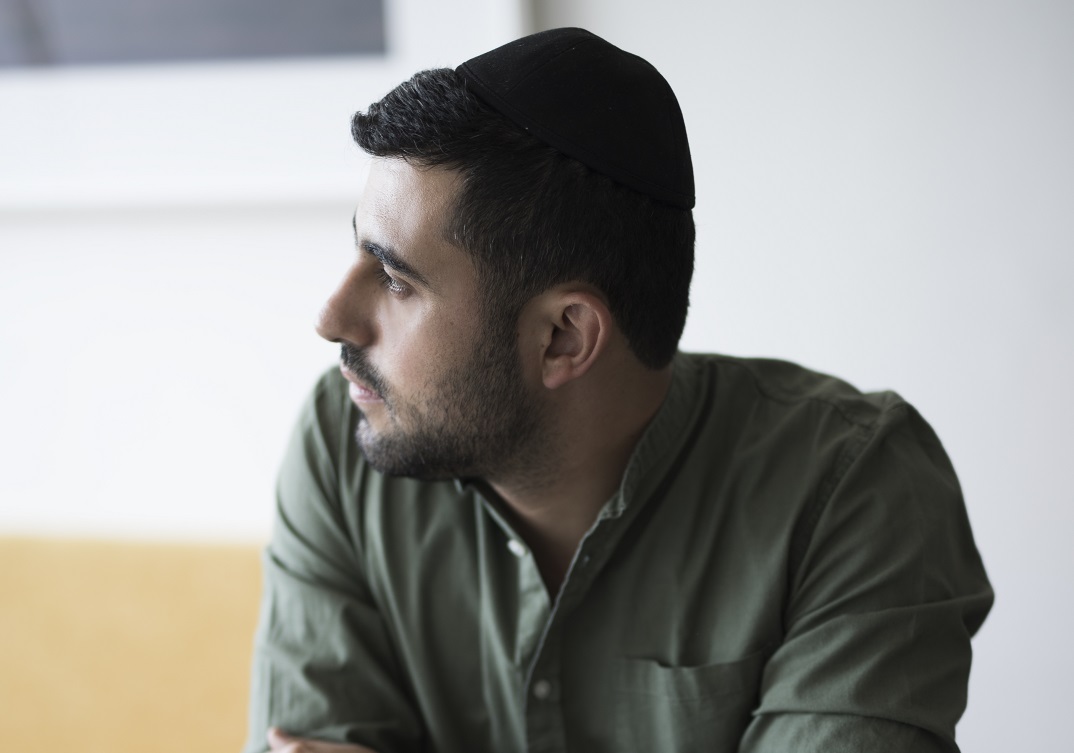
A Place of Healing
T
o find Ishay Ribo’s apartment, you walk past a makolet, around a small construction area, and up two flights of stairs in a three-story apartment building in a leafy, mixed-religious neighborhood in Jerusalem. There is no name on the door.
When he opens it, dressed casually in a short-sleeved blue shirt, I doubt for a moment that I’ve come to the right place. There is something refreshingly modest about Ribo, and his apartment is no different. It’s tastefully renovated but not huge, the apartment of a successful banker or advertising executive, not a popular music star.
We walk out to his balcony and there are small dishes of cookies and nuts waiting. If Ishay Ribo were a mood, he would be measured yet intense. He’s happy to chat, even likes to chat, but only about things that matter. Extraneous talk isn’t welcome. There’s work to be done, and Ribo is busy.
He was born in Marseilles, France, to parents from North Africa. He grew up in a traditional home, but his parents became more observant before the family made aliyah when Ribo was eight. After settling in Kfar Adumim, a small yishuv, young Ishay attended a Zilberman-style school in the Bucharim neighborhood of Jerusalem.
There wasn’t a lot of music in the house growing up, but he always loved to sing, and discovered at the age of 12 that he had a talent for composing songs. At first, he recorded himself drumming on the table and singing.
“It was sort of a personal escape for me as a boy, my own little corner,” he says. “I didn’t share it with the world. Everyone knew I liked to sing, but it was my own private space, a place of healing.”
Then, at the age of 17, he picked up a guitar and taught himself to play. He was in yeshivah at the time, in Gilo. To that point, he had been exposed mostly to religious music — Avraham Fried, Chaim Yisrael, Mordechai Ben David. And then one day a bus ride changed his life.
It was a song by Amir Benayoun, a Sephardi singer known for his soaring voice and heartfelt lyrics. Ribo heard his song, “Semachot Ketanot,” blasting out of the driver’s radio. The next day, he climbed the stairs of a bus again, going nowhere in particular, in hopes of hearing the same song. Then he did it again. And again.
“What attracted me was that for the first time I heard a vocalist who sings beautifully and also writes his own songs,” Ribo says. “I always thought there were people who sang, and people who write their songs, and that they’re two separate fields. But then I heard [Benayoun], and was exposed to others like Evyatar Banai. With all these singers, there is great significance to the text.”
Ribo is not a religious musician in the mold of his boyhood favorites, primarily because his sound is closer to popular music. But his lyrics are unmistakably of a religious nature. He writes about love of HaKadosh Baruch Hu, the desire to come close, and the pain of galus.
That is intentional, he says. Though he listened to all kinds of music as a teenager, he made a decision early on to base his songs on the realm of the heart and soul.
“From a young age, I made a resolution to write songs only about kodesh [subjects] and emunah, only songs that are connected to Hashem Yitbarach, to Yiddishkeit. And I believe that’s where my siyata d’Shmaya comes from.”
His early writing produced hits like “Lashuv Habaita,” a song about returning to Hashem that appeared on his third album, Shetach Afor (Gray Area). Ribo hesitated to release it at the time because, he says, he feared the lyrics were too undeveloped, immature. It has since become one of his biggest hits, attracting close to 120 million views online. Like all of his best songs, it is a perfect marriage of harmony and meaning, a deep message contained in a beautiful melody.
הגיע הזמן להתעורר
לעזוב הכל להתגבר
לשוב הביתה, לא לחפש מקום אחר
הגיע הזמן להשתנות
גם אם פספסנו כמה תחנות
אפשר לרדת, יש רכבת חזרה לשכונות
The time has come to wake up,
To leave everything, to overcome;
To return home, not seek anything else;
The time has come to change;
Even if we missed a few stops,
We can still get off, there’s a train heading back to town
The Long Wait
T
he same easy sound of “Lashuv Habaita” is also found on “Kol Dodi Dofek,” another song of that period. In fact, even before Ribo appeared onstage with Idan Raichel, he performed the song live on Menachem Toker’s radio program.
“One day I’m on the radio and [the Israeli singer] Gad Elbaz sends me a song,” Toker says. “He told me a yeshivish guy from Yerushalayim named Ribo has some nice songs, and that you’re going to hear about him. A couple weeks later, [Ribo] calls and says that he has a new song, so I brought him to the studio.”
Toker is proud that he was the first to give Ribo a platform to play his music but calls himself “the biggest loser in the world” for not immediately recognizing Ribo’s talent and appeal.
Like “Lashuv Habaita,” “Kol Dodi Dofek” is a song of return and longing for days ahead.
קול דודי הנה זה בא, ככה מספרים
להסיר את כל הרע, ואת קרננו להרים
מתוך תהומות עפר
ולהקיץ נרדמים עם תרועת שופר
The voice of my beloved, behold he comes — so they say —
To cast off all evil; to raise our fortunes
Out of the muddy abyss,
And awaken the sleepers with a shofar blast
I
n those early days, he says, there were numerous people who tried to temper his dreams. Who will be your audience? they would say. He wasn’t making “yeshivish” or “chassidish” music, and he wasn’t making pop.
Those doubts hung in the air as he entered the recording studio for the first time in 2012. He had married that year, and the wedding left him with about NIS 100,000 in gift money. He told his wife Yael that the sum wasn’t enough for a down payment on a house, but it was enough to record an album. He was 21 years old, still in the army, and starting a new life. His wife was all in.
He had prepared about 15 songs for the album, but at the last minute, added another one to the mix. That song was “Tocho Ratzuf Ahava.”
“What would people tell me?” Ribo recounts. “Things like Listen, religious music is not relevant. You can do religious music for weddings — and mine wasn’t wedding music — so where do you want to perform? Separate audiences? Chareidim? I didn’t have answers. I said I believe in it and I don’t know what to tell you. And what happened was that we released ‘Tocho Ratzuf Ahava,’ and we heard nothing about it, as was natural — and, the money ran out,” he says, laughing. “I didn’t have where to turn. My parents helped me out a bit, and slowly, slowly…”
For two years, the single circulated. It was rejected by Galgalatz, the radio station where Israeli hits are born, but was on heavy rotation on the playlists of religious radio stations.
But then came 2014: In quick order, he released his first album, also called Tocho Ratzuf Ahava, was invited onstage by Raichel, and, finally, Galgalatz called. Ironically, once the song got some attention on Galgalatz, the religious sector clamored for more.
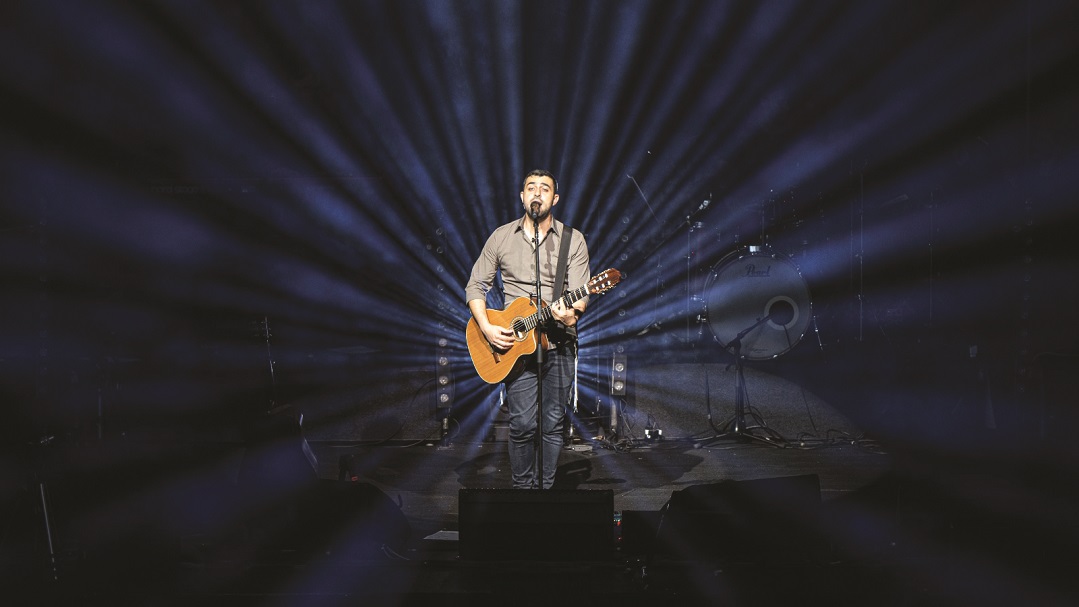
“Tocho Ratzuf Ahava” is a masterpiece. From the opening chords of the piano to the complex weave of the lyrics, it’s a song that never seems to get old. It’s also a song whose lyrics are difficult to decipher. With sources in Navi, Tehillim, Shir Hashirim, and Mishlei, Ribo describes it as a song about “Hashem’s mercy and His love for His people.” We sat for several minutes discussing the song, and he took us into his creative process.
“When I write, I look for some point [of entry], some twist. So, for instance [the opening lines of the song], ‘choseich shivto mibli lach’soch et ahavato.’ It says in Mishlei, ‘Hachoseich shivto sonei et beno,’ which means that a person who isn’t strict when necessary shows that he doesn’t care enough about you to take the trouble. So I said HaKadosh Baruch Hu is choseich shivto mibli lach’soch et ahavato, which means that Hashem and Hashem exclusively has it in His power to be merciful — Av Harachamim, basically. But at the same time, that doesn’t mean that He doesn’t love us. He is strict with us, but He also loves us.
“Later [in the song], there are all kinds of [poetic allusions]: ‘gam kshe’anu shivrei keilim, odeinu kli chemdato,’ which means even when we’re broken vessels and we’re in deep despair we’re still the beloved vessel of the Creator.
“And [then the chorus is] ‘Tocho ratzuf ahavah, beito tzafuf lirvachah.’ What does that mean, ‘beito tzafuf lirvacha’? It’s written that one of the ten miracles in the Beit Hamikdash was that at
the times of aliyah l’regel [holidays], ‘hayu omdim tzefufim, u’mishtachavim revachim’ [when standing, everyone was crowded, but when bowing everyone had room].
“Now, ‘House’ can mean many things, but I meant it to refer to Eretz Yisrael. Because it’s kibbutz galuyot, basically. It’s a crowded, small country, really, but it’s open to everyone.”
חושך שבטו, מבלי לחשוך את אהבתו
מושיט את שרביטו, לכל הפושט ידו
עין לא מעלים, מעל צאן מרעיתו
גם כשאנו שברי כלים, עודנו כלי חמדתו
תוכו רצוף אהבה, רצוף אהבה
ביתו צפוף לרווחה, צפוף לרווחה
ממציא לנו מחילה, לא רק בשעת הנעילה
לך דומיה תהילה
Slow to use the rod, but not lax in his love;
He extends his scepter to all who seek his favor;
He watches over his flock, never turning his eyes away;
Though broken in soul, we are still dear to him;
His whole essence radiating love, radiating love;
His house ever full, yet with room for all;
Inventing excuses to pardon us, not only during Ne’ilah;
Before You praise is dumbstruck, unable to express Your greatness.
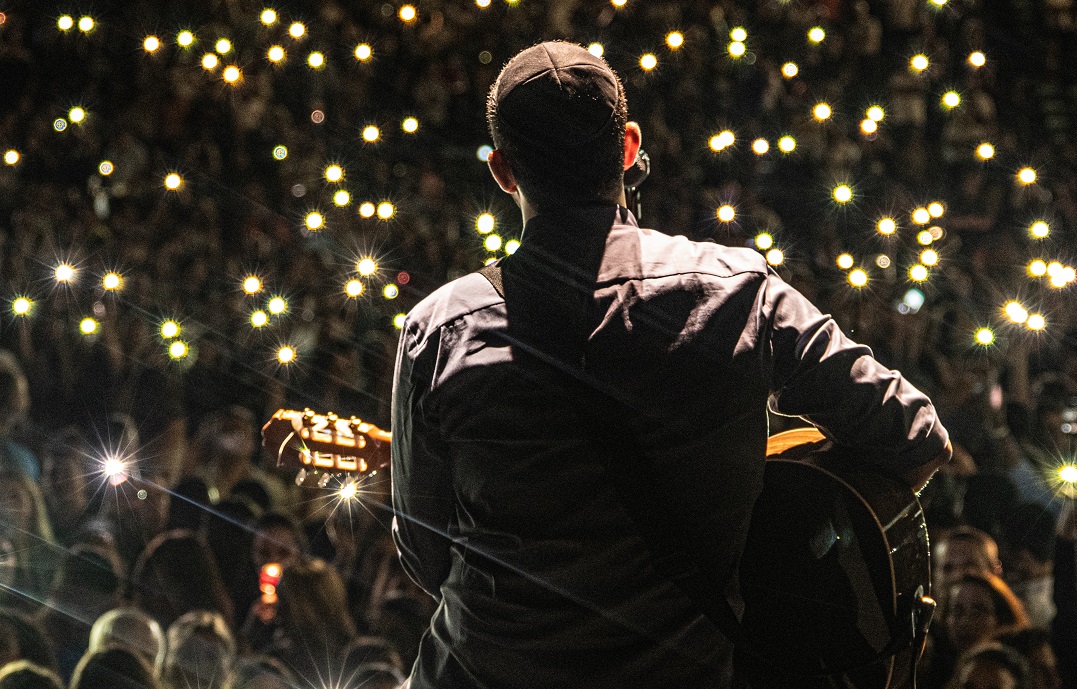
With a Broken Heart
W
hen I first started listening to Ribo’s music, I sensed in his tone, and the mood of many of his songs, someone who had struggled and perhaps been broken in life.
There is a great yearning in both his lyrics and presentation, and personal experience is often an artist’s deepest source of material.
So it surprises me when Ribo says that he rarely writes about his personal life.
“The truth is that I generally don’t write about things that are too personal. I don’t write about pain, generally,” he says. “I think of ideas, of things that need to be said, that I feel that I need to say.”
But there are songs he composes, he says, that are of a personal nature that simultaneously speak to a universal feeling. One of those is “Halev Sheli,” a hit from his fourth album, Shetach Afor. Its opening lines are:
הלב שלי נקרע לשניים
מה שלא ראתה שפחה על המים
כמו סופה מן הים הולם
כמו תופה של מרים פועם
ואין תרופה בעולם
ורק אתה יכול להפוך מספדי למחול
לזכך את החול
לרכך בי הכל
ורק אתה מבין איך לגשת ללב שלי
משכך כל כאב שבי
מרפא את הלב
My heart is torn in two —
What the maidservant couldn’t see in the waters [of Yam Suf];
Like a storm in the sea crashing,
Like Miriam’s tambourine pounding;
And there is no cure in the world.
And only You can turn my lamentations into dance,
Purify rough sand,
Refine everything within me;
And only You know how to enter my heart,
Relieving all pain within me,
Healing my heart.
In concert, Ribo likes to tell the story of how he came to write the last stanza of the song, which is based on a midrash from the Ibn Ezra. On a first reading, the lyrics are seemingly opaque.
ויש עוד צר שמציק לצאן
ואין ציר שיצעק לצור
רק אני מול ים שלם ולב שבור
He explains:
“Two years ago, I was hosted over Pesach in a hotel — I made an appearance there. And this elderly Jew approaches me and says he wants to tell me a midrash on Shvii shel Pesach by the Ibn Ezra. He wrote as follows:
“Four stood by the sea: tzar, tzon, tzir, and Tzur. Tzar [affliction] is the Mitzrim, tzon [flock] is Am Yisrael, tzir [emissary] is Moshe Rabbeinu — it says about him that he was a ‘tzir ne’eman’ — and Tzur [Rock] is the Creator.
“So [the Ibn Ezra] says: Tzar heitzik l’tzon, meaning, the Mitzrim attacked Am Yisrael. Tzon tza’ak latzir — Am Yisrael called out to Moshe Rabbeinu to comfort them. Tzir kara l’Tzur, Moshe prayed to Hashem. And Tzur tzivah et tzir, Hashem commanded Moshe Rabbeinu, ‘Tzei ve’chaleitz et tzoni miyad tzar.’ That’s basically the whole story of Kri’at Yam Suf. So I thought that was amazing.
“And I remember on that Motzaei Shabbat I ran to Google to look this up. And from this the song was born. I realized that we’re in a reality today that yeish od tzar shemeitzik l’tzon. Today we’re in a reality that’s a sort of geulah but also a galut, that there’s another tzar. They’re always murdering us, always reviling us. So, yeish od tzar shmeitzik l’tzon, v’ein od tzir sheyitz’ak l’Tzur — there’s no Moshe Rabbeinu today who will cry out to Hashem. Instead, ‘rak ani mul yam shaleim im lev shabur [I alone face the sea with a broken heart].’
“And that’s a point that I think is both personal and universal. It speaks about me as an individual, and also about Am Yisrael, that we’re in galut. And so I feel like I’m writing something that we as a people, both generally and individually, are going through.”
We're All Brothers
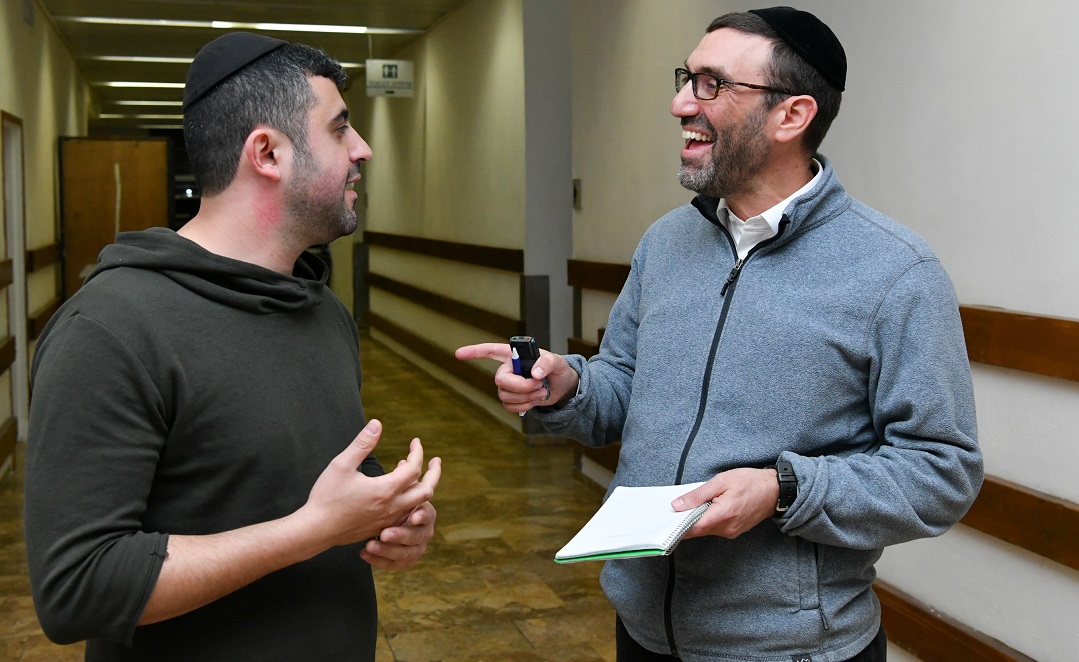
Backstage, Ishay Ribo shares his dreams with Mishpacha's Gershon Burstyn. "I feel like I'm writing something that we as a people are going through."
T
he distance from the Binyanei Ha’umah dressing room to the stage is all but 200 feet, but the passage feels like a wormhole between two worlds. On the one side, there’s the rickety table and the floor that hasn’t been replaced since Binyanei Ha’umah was completed in 1963. On the other, there are bright, flashing lights and billowing smoke, adoring fans who rise to their feet to cheer, and huge video screens projecting the band like giants. So it’s a bit hard to reconcile Ribo, who is so casual and cool, so down to earth, with his other persona — music star.
He, too, says it has taken him a while to harmonize the two sides, his two identities. But he’s learning.
“If I compare it to last winter, I’m calmer,” he says, sitting comfortably in an arm chair in a waiting room backstage. “I’m doing bigger things now, but I don’t take every opportunity I’m offered. I’m also learning how to handle it, to live it. On the one hand, I have no more privacy, but the minute that happens, you learn how to be with your family. I mostly spend Shabbat at home, and I make sure to be home whatever nights I can with my three boys to help with baths and bedtime. Baruch Hashem, it’s been a very busy time.”
Ribo likes to say that if he had appeared on the scene 15 years ago, no one would have been interested in him. Back then, there was no room for a religious musician who dresses in a hoodie and wears a big black kippah and sings the praises of HaKadosh Baruch Hu to mixed audiences.
But now something has changed. While the battle rages over the place and purpose of religion in the State of Israel, there is also a new openness, especially among secular Israelis, to let a little emunah into their lives. Ribo is just a musician, but he’s also become a symbol as a social harmonizer, someone who can straddle both worlds and connect them in conversation.
“I think here in Israel, especially recently, there is on the one hand the media generating so much strife over issues of state and religion, between religious and secular, as if it’s two things, as if we’re not the same nation, chas v’shalom,” he says. “And through music and these songs, we generate the exact opposite. Suddenly you see religious and secular coming and singing together, songs of emunah and HaKadosh Baruch Hu — and the nation is thirsty for it.”
We live in extreme times. There are Shabbos buses in Tel Aviv, and counter-protests in Bnei Brak. There’s the interminable battle over control of the Kosel, and the sore point of civil versus religious marriage. But there’s also a yearning for spirituality, a desire to come close. It’s as if HaKadosh Baruch Hu created one to counterbalance the other.
“Music and song is a point of consolation,” Ribo explains. “It’s a place where people can escape and connect and put the stigmas aside, put the media narrative aside, and see one another as brother and sister. It’s important to remember that we are brothers. And music, when it conveys a message of Torah and Yahadut, helps that happen.” —
— Song translations by Reuven Pride
(Originally featured in Mishpacha, Issue 791)
Oops! We could not locate your form.

